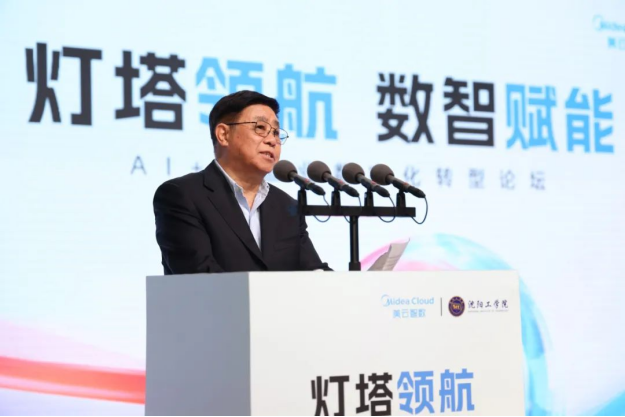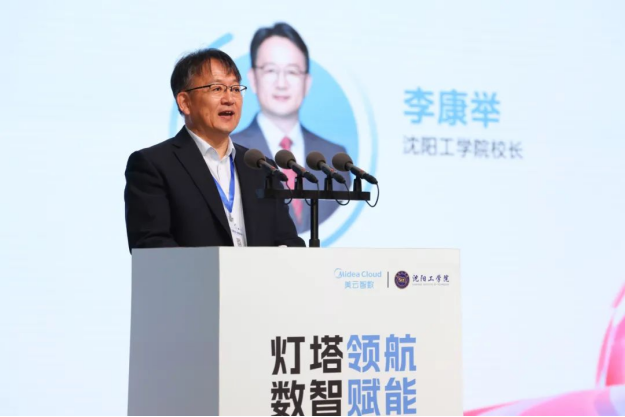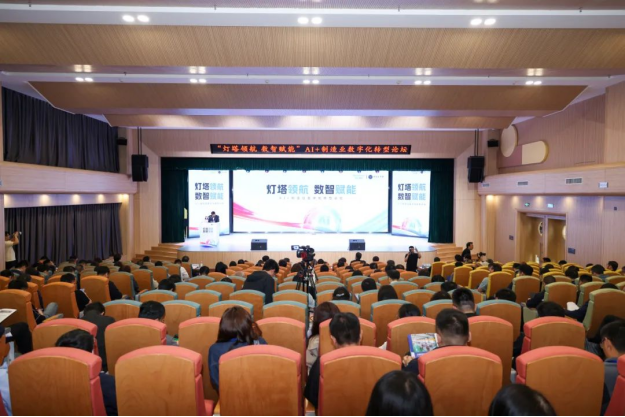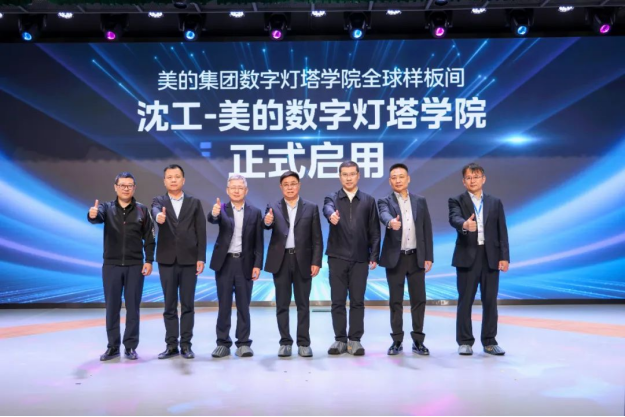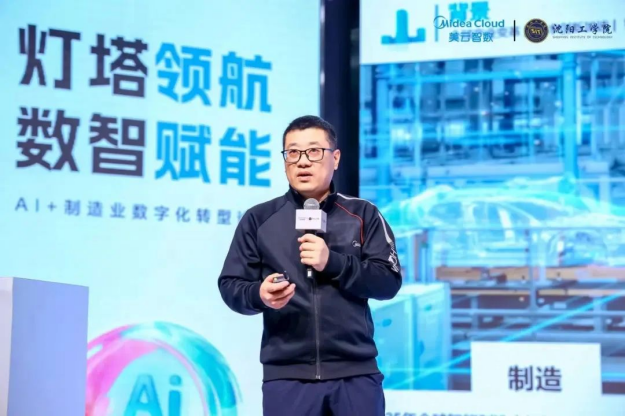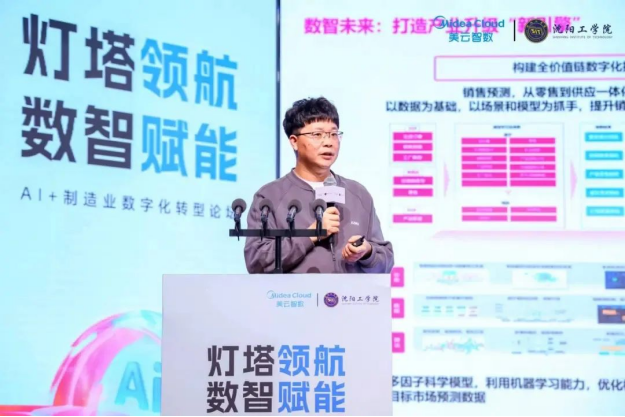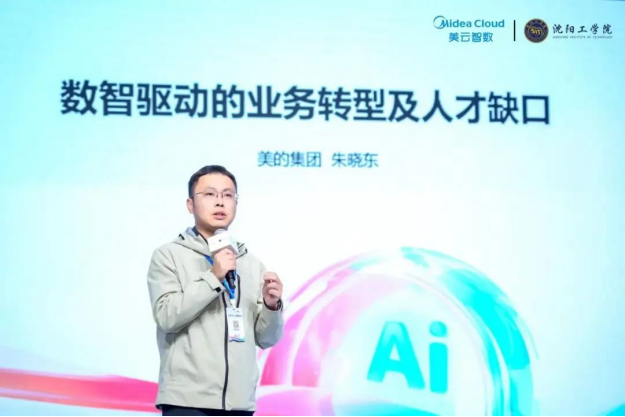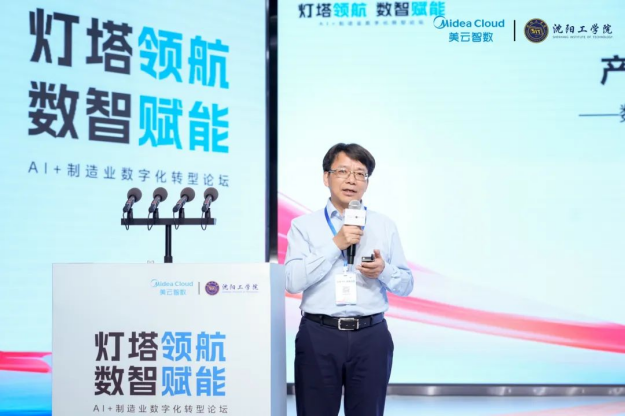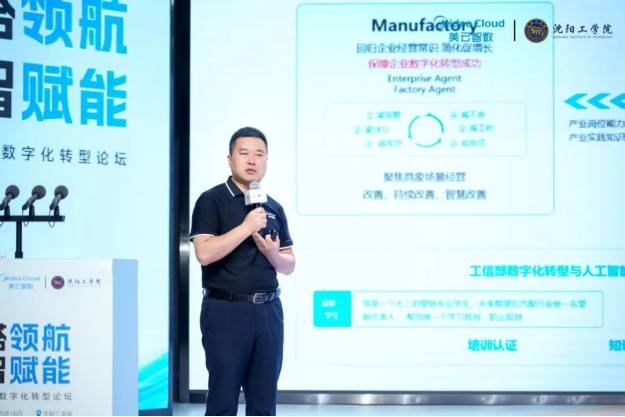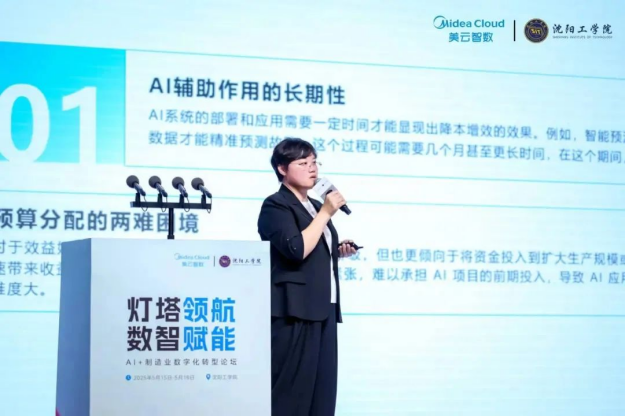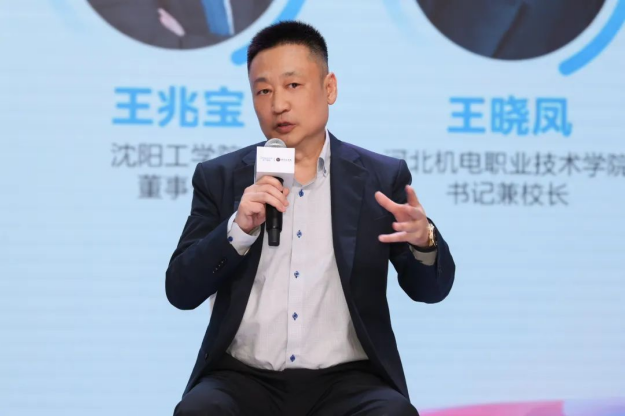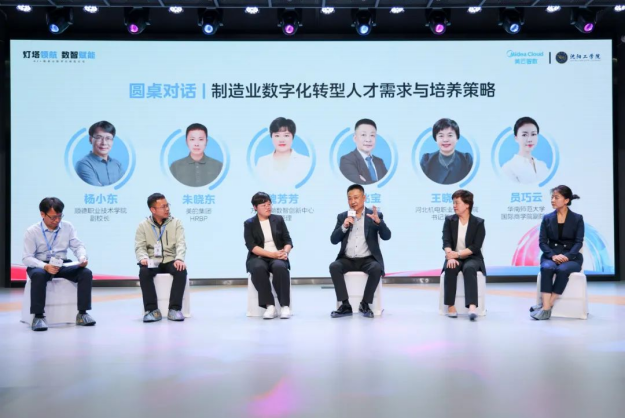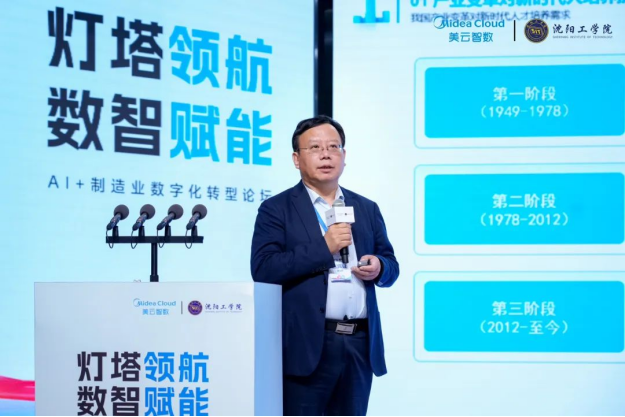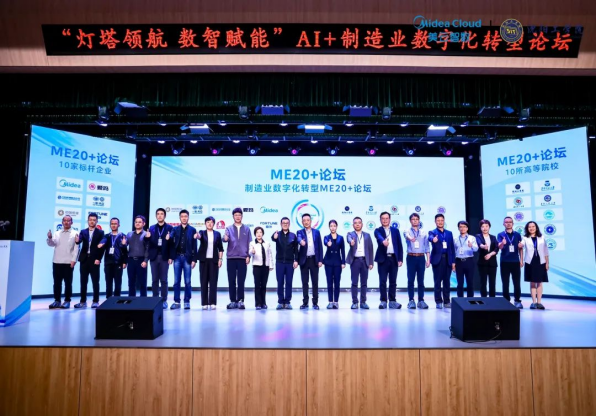On May 15, under the guidance of the Liaoning Provincial Department of Industry and Information Technology and the Liaoning Provincial Department of Education, Shenyang Institute of Technology, in collaboration with Meiyun Zhishu, successfully hosted the “Lighthouse Leading, Digital Intelligence Empowering” AI + Manufacturing Digital Transformation Forum. Nearly 300 leaders, experts, scholars, partners, and media guests from the education sector gathered to engage in in-depth discussions on topics such as AI+manufacturing digital transformation, industry-education integration, and talent development.
SIT and Midea “light up” the digital lighthouse
At the meeting, Midea Group and Shenyang Institute of Technology signed a strategic cooperation agreement and unveiled the global model room of the Midea Digital Lighthouse Academy. The 'Shenyang Institute of Technology-Midea Digital Lighthouse Academy’ was officially launched, marking the establishment of the first digital talent training model in China that deeply integrates manufacturing practices with educational resources. Attendees included Zhang Feng, Secretary of the Party Committee of the China Electronics Society Council and former member of the Party Leadership Group and Chief Engineer of the Ministry of Industry and Information Technology; Ma Zhongbin, Deputy Inspector of the Liaoning Provincial Department of Industry and Information Technology; leaders from the Liaoning Provincial Department of Education; Wang Zhaobao, Chairman of Shenyang Institute of Technology; Li Kangju, President of Shenyang Institute of Technology; Wang Xinliang, President of Midea Group Enterprise Business; and Jin Jiang, President of Meiyun Zhishu. Representatives from companies such as Aima Technology, Fuchuang Precision, Orient Rainbow, and FAW-Volkswagen, along with guests from institutions like Shenyang Institute of Technology, South China Normal University, Shenyang University of Science and Technology, and Liaoning University of Technology, also attended the event.
In his speech, Li Kangju stated that there is no standard solution for digital transformation; action is the best approach. Shenyang Institute of Technology has partnered with leading enterprises both domestically and internationally to establish 18 modern industrial colleges and 24 practical teaching centers, including Midea, which have been quickly put into use. These centers aim to align with the products, technologies, projects, and talent needs of enterprises, using modern industrial colleges as a platform for deep collaboration between schools and enterprises. Together, they aim to cultivate students 'ability to solve complex problems using digital technology. The school is actively promoting digital transformation, drawing inspiration from Midea’s Lighthouse Factory system’s digital control platform. This initiative aims to create a digital and intelligent management and operation framework for the school's teaching, research, management, and services. The structure of the school’s digital transformation teaching management platform is becoming increasingly rational, and its functions are growing stronger.
Shen Gong-Digital Lighthouse College embodies the decades of manufacturing business practice and digital transformation experience of Midea Group, introduces cutting-edge technologies such as industrial big data, industrial simulation and AIGC, forms an industry-education integration education model with characteristics of the times, and creates a global model room for Midea Group’s Digital Lighthouse College.
In his speech, Jin Jiang highlighted the innovation of the Digital Lighthouse Academy, which is built on a 'three-pronged mechanism’: first, co-developing a curriculum system by transforming real-world enterprise scenarios from the national dual-cross platform into teaching cases; second, jointly cultivating a dual-teacher team to facilitate effective interaction between engineers and educators, promoting the co-learning, sharing, and co-construction of knowledge from both corporate and academic perspectives; third, creating a practical platform by linking internship and employment opportunities with Midea and its core clients, ensuring that students can connect with practical platforms before graduation, thereby achieving high-quality employment for graduates.
In the future, Midea Group’s Meiyun Zhishu will continue to support Shenyang Institute of Technology in achieving three benchmarks: first, to become a benchmark for the Northeast region’s industry-education integration reform pilot zone, cultivating intelligent manufacturing system engineers; second, to establish itself as a national model of modern industrial colleges, with graduates receiving authoritative digital talent certifications from the Ministry of Industry and Information Technology; third, to set a benchmark for school-enterprise collaborative innovation, jointly applying for provincial, ministerial, and national-level research projects.
In his speech, Zhang Feng highlighted that the SIT-Midea Digital Lighthouse Academy, an innovative platform formed by the Ministry of Education's first batch of modern industrial colleges and a global technology group, not only marks the entry into the 3.0 era of industry-education integration in China but also signifies a new historical peak in the synchronization between education and industry during the transition from Made in China to Smart Made in China. As one of the first universities in the country to implement' New Engineering initiatives, Shenyang Institute of Technology has innovatively set up classrooms along the industrial chain. The Intelligent Manufacturing+Industrial Internet curriculum system, co-developed with Midea, includes 12 cutting-edge modules such as digital twin workshop planning and industrial APP development. The teaching case library, jointly developed, is based on real-world scenarios from six world-class Lighthouse Factories of Midea. This educational model, which emphasizes writing papers in workshops and growing knowledge on production lines, is addressing the structural issue where companies are eager for talent while students lack practical skills. We look forward to Shenyang Institute of Technology and Midea Group working together to write a grand chapter in the new era of industry-education integration.
To build a global model room for digital talent training
Currently, Liaoning is leading the way in building a Digital Liaoning, Intelligent Manufacturing Power initiative, aiming to create a Liaoning model for leveraging digital technology to upgrade traditional industries. As one of the provincial universities, Shenyang Institute of Technology has consistently prioritized openness and innovation in its development strategy. The SIT-Midea Digital Lighthouse College serves as a hub for technological innovation, an incubator for talent development, and a model for industry-education integration, ensuring that the cultivation of talent aligns with industrial upgrading.
SIT-Midea Digital Lighthouse Academy innovatively adopts an immersive practical education approach, leveraging the national cross-platform -Meiqing Industrial Internet Platform, and deeply integrating with KUKA robot technology, a member of the global 'four major industrial robot families'. This integration forms a four-pronged talent development system: automation, lean management, digitalization, and intelligence, creating a new paradigm for industry-education integration. The academy focuses on cultivating digital talents who can integrate the entire value chain of manufacturing enterprises. By using the modern manufacturing enterprise digital practice teaching platform as a foundation, it refines business-based training scenarios, identifies typical positions based on these scenarios, selects key tasks based on these positions, and transforms these tasks into practical courses, thus forming a task-driven practical teaching model.
Both parties will leverage their multi-modal resource advantages to jointly build a new ecosystem that promotes the integration of industry and education, aiming to cultivate innovative digital composite talents. Midea Group will actively participate in the development of talent training programs at Shenyang Institute of Technology, optimizing course settings based on industry trends and corporate needs. They will establish specialized professional directions in key areas such as intelligent manufacturing and digital technology, customizing unique course systems to ensure precise alignment between talent cultivation and corporate demands. Midea Group will provide a wide range of internship opportunities for students at Shenyang Institute of Technology and regularly organize job fairs to broaden employment opportunities for graduates.
At the same time, both parties will collaborate to establish a practical teaching base. Midea Group will provide advanced technology and project cases to create highly realistic enterprise work environments for student practical training and employee skill enhancement. In terms of research, both sides will focus on areas such as intelligent manufacturing, establishing an innovation platform to accelerate the transformation and industrialization of scientific and technological achievements. Regarding curriculum development, both parties will jointly develop courses, build a digital teaching resource library, organize subject competitions, and host enterprise open days, all aimed at jointly promoting the construction of a smart campus at Shenyang Institute of Technology and exploring new methods of digital teaching empowerment.
ME20+Forum on Digital Transformation of Manufacturing
At the ME20+Forum on the Digital Transformation of Manufacturing, experts from enterprises and universities engaged in in-depth discussions and shared their experiences on three key topics: “Demand Side Perspective——Core Competencies and Precise Alignment of Digital Talent in Manufacturing”, “Supply Side Innovation——Practices and Breakthroughs in Digital Talent Development at Educational Institutions,” and “Strategic Release of the ME Agent Co-creation Plan.” These discussions provided new ideas and directions for the development of digital and intelligent talent.
At the forum, numerous experts from enterprises and universities delivered insightful keynote speeches. Lu Huabei, CIO of Aima Technology, presented a report titled “Talent Demand Pain Points in the Digital Transformation of Enterprises,” which delved into the challenges faced by companies in meeting talent needs during digital transformation. Wei Fangfang, General Manager of Wanxiang Qianchao Digital Innovation Center, discussed "Breaking the Deadlock: Three Challenges and Practical Approaches to Implementing AI in Manufacturing" and shared practical experiences in applying AI in manufacturing. Zhu Xiaodong, HRBP of Midea Group, addressed the contradiction between business transformation and talent supply and demand in his report “Digital-Driven Business Transformation and Talent Shortage.” On the university side, Zhang Qijian, President of Liaoning University of Technology, presented “Interdisciplinary Integration and Innovative Talent Cultivation Pathways,” while Yang Xiaodong, Vice President of Shunde Polytechnic, shared insights on “Digital Talent Development.”
At the roundtable forum on “Talent Demand and Training Strategies for Digital Transformation in Manufacturing,” our school's chairman Wang Zhaobao, Deputy Dean of the International Business School at South China Normal University Yan Qiaoyun, General Manager of Wanxiang Qianchao Digital Innovation Center Wei Fangfang, HRBP Zhu Xiaodong of Midea Group, Secretary and President of Hebei Mechanical and Electrical Vocational and Technical College Wang Xiaofeng, and Vice President of Shunde Vocational and Technical College Yang Xiaodong engaged in an in-depth discussion on several key topics. These included the cultivation of digital compound talents, AI innovation talents, and overseas talent development under the backdrop of international expansion. The guests shared their insights and practical experiences, offering many forward-thinking and actionable suggestions. The discussion was intense and rich in valuable insights.
Drawing on his practical experience in integrating industry and education at schools, Wang Zhaobao shared innovative ideas and specific measures for cultivating digital talents in higher education. He suggested that in the new era, the integration of industry and education has transcended the traditional framework of introducing technology and courses. Universities should adopt a four-in-one deep integration model: not only by introducing cutting-edge technologies and high-quality course systems from enterprises but also by infusing corporate culture into the campus environment. Additionally, universities should establish a standardized faculty training system based on real business scenarios to comprehensively enhance teachers’ teaching capabilities. Through immersive practical teaching, students can gain valuable experience in real-world work environments, thus cultivating digital talents who are both theoretically sound and meet the actual needs of enterprises. Midea Group, a leading Chinese manufacturing company, serves as a benchmark for the digital transformation of manufacturing enterprises. It not only provides replicable experiences for industry development but also points the way for future digital transformation. Wang Zhaobao emphasized that universities collaborating closely with industry leaders like Midea Group can accurately grasp the pulse of the industry, timely adjust talent cultivation plans, and achieve seamless alignment between educational supply and industrial demand, laying a solid foundation for cultivating high-quality digital talents that meet the demands of the times.
This collaboration not only deeply integrates the resources of schools and enterprises but also provides a dual engine of talent + technology for the digital transformation of manufacturing, setting a new benchmark for industry-education integration nationwide. The Digital Lighthouse Academy, through its closed-loop model of 'education nurturing industry and industry empowering education, addresses the challenges of traditional industry-education integration and delivers versatile digital talents to the industry. Moving forward, both parties will deepen their cooperation, continuously refine the talent development system, and drive the advancement of China's intelligent manufacturing.
Translated by Basic Courses Department
